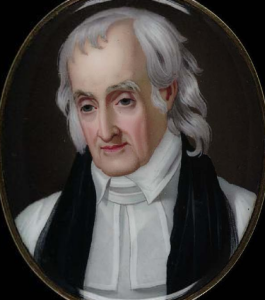I am an unabashed, unapologetic fan of General Convention. I know this very well might put me in a minority position. In Episcopal Church circles it is not uncommon to hear people complain about General Convention – that it is too long, too big, not responsive enough to change, a waste of resources. Like any ecclesiastical or legislative body, there are always things that can be done to improve General Convention. But for this church nerd, General Convention gets my juices flowing.

General Convention represents a synthesis of these two views. At it, bishops have their own house and are able to deliberate in it, present resolutions, and offer teaching as a body. At the same, laity and clergy in the House of Deputies engage in the legislative process. While one of the proposals of the Task Force for Reimaging the Episcopal Church (TREC) proposes only a unicameral General Convention in the future, I think we lose something with that model. The synthesis of the views of White and Seabury connects our polity to a vibrant aspect of our dual emphasis on apostolic succession and lay participation in ministry.
But General Convention is not exciting just because of how it is structured. What I get most out of General Convention is all of the wonderful opportunities for meeting the great variety of people who have found a home in the Episcopal Church. In prior years I have stood in the booth of my seminary and met alumni from years past. I have met people in real life that I had only known via social media and created true friendships. I have discovered new opportunities for ministries to become involved in, projects to advocate for, and networks to join. At the various Eucharistic services people from all over the church are brought together and sent forth to continue doing the work they have been called to. Part of the TREC proposal is to have General Convention become more of a “ministry jamboree” where more opportunities for collaboration and networking for ministry happen. I love that idea because General Convention is such a natural place for these connections to occur.
Finally, I love General Convention because I return from it energized. I might be tired from late nights and early mornings while there, but I fly home with a stack of business cards reminding me of new connections and new opportunities. I come home with a bigger sense of the work the church is doing and how my own vocation fits into it. I settle back into my old routines with a refreshed sense of purpose, eager to roll up my sleeves and contribute to the church I love.
General Convention is hard work for many people. It can get messy and sometimes go in directions we do not expect. But at its best, General Convention is a special event that every three years puts an extra bounce in my step.
And so, reader, what about you? What about General Convention gets you excited or piques your interest?
Dr. Joslyn-Siemiatkoski (@danjoslynsiem) joined the seminary faculty in Fall 2014 following his tenure since 2005 on the faculty at Church Divinity School of the Pacific in Berkeley, California. His areas of interest include Jewish-Christian history, the history of Anglican ecclesiology, and contemporary interfaith dialogue.

